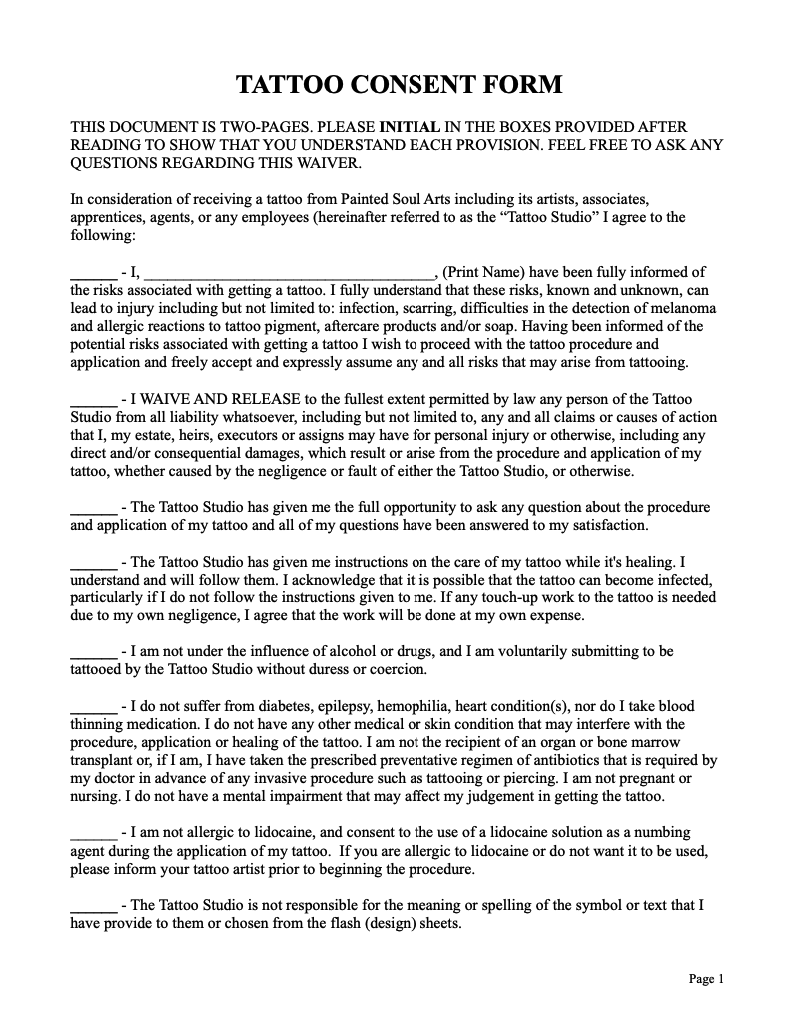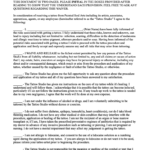Before a tattoo procedure, the person needing the tat will need to fill out a tattoo consent form. This consent form is available online and must be downloaded in a readable format, such as Microsoft Word (.docx), Adobe PDF, or Open Document Text (.odt).
Mandatory clauses
Mandatory clauses on a Tattoo consent form must include a declaration of any medical conditions that may interfere with healing. Patrons should also state whether they are willing to waive any rights to photos taken of their tattoos. Additionally, they should agree to reimburse the studio for any legal fees. In addition, they should state that they are of sound mind and free from intoxication. The Tattoo consent form should also include a signature at will.
Mandatory clauses on a Tattoo consent form should identify the tattoo studio and its employees. It should also clearly state that the individual getting the tattoo has read and understands the terms of the consent form. These clauses protect the artist, tattoo studio, and patron from liability and health risks associated with the procedure. The form should also list the names of any studio agents, associates, or employees.
Legal requirements
The legal requirements for a tattoo consent form include identifying the person getting the tattoo and their signature, which states that they have read and understood the document. The document should also outline the patron’s consent to the liability waiver and the tattoo studio’s obligation to provide the tattoo. The form should state that the patron has not been under the influence of alcohol or other drugs, is of sound mind, and has no underlying medical conditions that might cause harm.
The consent form for a minor should also clearly state the jurisdiction that applies to the tattoo. You must include state and county names to indicate the applicable laws. The name of the minor, as well as his or her legal guardian, should also be included. The minor’s contact information must also be included to communicate with if any questions arise. Finally, the form should include the minor’s name as it would appear on official documents.
Steps to filling out a form
A tattoo consent form includes the following information: rules and acknowledgements, consent statements, and conditional statements. The consent form must focus on the client’s willingness to allow a procedure and understand the statements contained therein. The client must sign the form at least 18 years old. A person must sign this consent form to undergo the procedure for legal purposes.
A tattoo consent form is a legal document that releases the tattoo studio or artist from liability for damages caused by the procedure. Before getting a tattoo, customers must complete a consent form that releases the tattoo artist from all liability. In addition, the customer must sign the form if they understand all of the aftercare instructions and are free from drugs or medication. If the customer refuses to sign the consent form, they may be sued by a third party for injury.
Requirements for minors
Tattoo artists use separate consent forms for minors. Minors must read all of the relevant laws regarding tattooing in their state before signing the consent form. Additionally, they must enter the name of their tattoo studio or artist and indicate the type of ink they wish to get. Finally, the minor must initial a paragraph stating they have read the risks and are satisfied. This section will vary depending on which state the artist practices in.
Those who get tattoos often sign a consent form to release the artist from liability. Minors must also sign a form signed by their parents or legal guardians. This document must follow all state laws regarding tattooing and is not required in every state. In many cases, the consent form must be notarized. If a minor doesn’t have a legal guardian, a parent or legal guardian should sign it.
Medical conditions
Below are some medical conditions you should be aware of when filling out a Tattoo Consent Form. Some common medical conditions include allergies to skin prep and adhesives or even tattoo wraps. If you have any of these conditions, you should state them on your Tattoo Consent Form. This is a time-consuming process but a vital part of the procedure.
Legal obligations of the tattoo artist
Tattoo artists are legally obligated to follow certain health and safety standards. For example, the state must set minimum standards for body art establishments, including proper bodily fluids disposal, equipment sterilisation, and business procedures. The state also requires operators to meet certain employment requirements. The DHS also specifies compliance with minimum standards as a condition of licensure. Additionally, counties must adopt standards at least as strict as DHS’s.
As the popularity of tattoos increases, so do the legal risks that accompany the industry. As a result, tattoo artists must educate themselves on the proper safety procedures to minimize potential risks. Inadequately performed tattoos can result in disfigurement and may even lead to a lawsuit. Tattoo artists should also ensure that they carry out customer ID checks to avoid liability. A tattoo artist’s negligence can result in lawsuits, and a complaint may lead to a hefty settlement.

